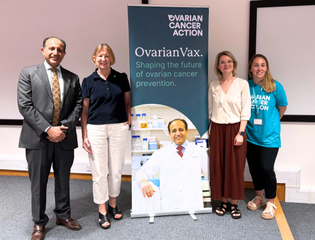“Every woman would benefit from this research.”
Every year, over 6,000 women in the UK and 250,000 globally are diagnosed with high-grade serous ovarian cancer, often too late for effective treatment.
But what if we could prevent ovarian cancer altogether?
OvarianVax is a groundbreaking research project with the potential to do just that - and it’s being developed right now, here in the UK.
The science behind a breakthrough
In 2024, this work took a very exciting leap, with Professor Ahmed using these discoveries to underpin a new, ambitious goal – to create a vaccine that could prevent ovarian cancer from developing in the first place.
In the Early Detection programme his team discovered that immune cells in the fallopian tube - the tissue where many ovarian cancers begin - can “remember” cancer cells.
His Immunotherapy project took this knowledge further with the discovery that these fallopian tube immune cells could be trained to recognise ovarian cancer before they had seen it before.
How did we get here?
Over the past decade, Ovarian Cancer Action has funded Professor Ahmed's research to unlock the clues about how ovarian cancer first develops in the fallopian tubes, and how the immune system reacts to ovarian cancer in its pre-cancerous phase.
This is the foundational research that has lead to further funding of OvarianVax.
Thanks to initial funding from Cancer Research UK, work on the instruction manual is already producing promising early results.
Now, we need to accelerate both parts of the vaccine development – and move one step closer to clinical trials.
OvarianVax news and updates
Who could OvarianVax help - and when?
How OvarianVax could be rolled out
The first group that the vaccine could benefit are women with the BRCA gene mutation.
- 1 in 200 people in the UK carry a BRCA mutation.
- Among those of Ashkenazi Jewish descent, it’s 1 in 40.
These women face devastating decisions in early adulthood: double mastectomies, surgical menopause in their 30s, infertility, and constant fear of cancer. This vaccine could change that future entirely.
With the right funding, clinical trials for BRCA+ women could begin in under 5 years.
A vaccine for the next generation
While BRCA+ women face the highest risk, 80% of ovarian cancer cases are not caused by inherited genes.
That’s why OvarianVax has the potential to protect all women. If early trials are successful, the vaccine could be rolled out to the wider public, just like the HPV vaccine has helped reduce cervical cancer globally.
Cervical cancer may be eliminated by 2030 thanks to the HPV vaccine. Together, we can do the same for ovarian cancer.
OvarianVax is more than research — it’s a revolution in prevention, built on science, powered by people, and driven by urgency.
Join us in making ovarian cancer a disease of the past.
Powered by research, informed by patients
“The impact of ovarian cancer on my life has been, and is, huge. I don’t want a single other woman to have to experience this. A preventative vaccine feels like exactly the right place to be focusing research attention.” - Ovarian Cancer Action Research Network
From day one, this project has been shaped by the people it aims to help. Through our OCA Research Network and patient advisory group, women have directly influenced the design, priorities, and strategy of OvarianVax.
Want to get involved? We're continuing to support the OvarianVax project by working with our patient network. Find out about how to sign up and how to sign up.
We're funding the next big leap in preventing ovarian cancer
We’re so excited and proud to announce that Ovarian Cancer Action – because of your support – will be increasing our investment in the groundbreaking OvarianVax project.
We will be awarding Professor Ahmed and his team a grant of over £350,000 over the next three years, to help bring this world-first ovarian cancer prevention vaccine closer to reality.


